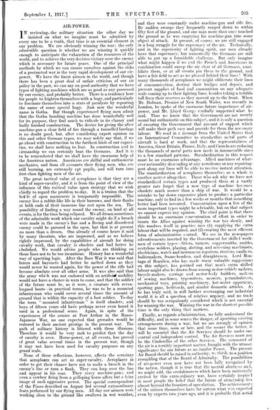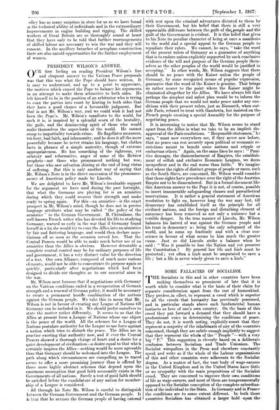AIR-POWER.
1N reviewing. the military situation the other day we insisted on what we imagine must be admitted by every one to be a truth, that time is an essential element in our problem. We are obviously winning the war ; the only admissible question is whether we are winning it quickly enough to anticipate the exhaustion of the resources of the world, and to achieve the very decisive victory over the enemy which is necessary for future peace. One of the principal methods by which we can ensure ourselves against the risks of a protracted war is the very rapid development of our air- power. We have the finest airmen in the world, and though there has been a great deal of unfair criticism of our air policy in the past, we can say on good authority that we have types of fighting machines which are as good as any possessed by our enemy, and probably better. There is a.tendency here for -people to frighten themselves with a bogy, and particularly to fascinate themselves into a state of paralysis by repeating the name of some special bogy. Just now the wonderful name is Gotha. But though experienced flying men admit that the Gotha bombing machine has done wonderfully well for its purpose, they find much to ridicule in its clumsy and badly finished construction. The device for giving the after machine-gun a clear field of fire through a tunnelled fuselage is no doubt good, but, after considering expert opinion on this and other German types, we may safely say that, if we go ahead with construction to the furthest limit of our capaci- ties, we shall have nothing to fear. In construction and in airmanship we can certainly beat the Germans. And it is to be remembered that we shall have the enormous help of the American nation. Americans are skilful and enthusiastic mechanics, and from all accounts their flying men, who are still learning, are extremely apt pupils, and will turn into first-class fighting men of the air.
The great tactical value of aeroplanes is that they are a kind of super-cavalry, and it is from the point of view of the influence of this tactical value upon strategy that we wish chiefly to regard the problem to-day. It is a truism that the battle of open manceuvre is temporarily impossible. The enemy live a rabbit-like life in their burrows, and their flanks at both ends of their immense line rest upon the sea. The possibility of finding a way round the enemy, on land at all events, is for the time being eclipsed. We all dream sometimes of the admirable work which our cavalry might do if a breach were made in the enemy's line and a fleeing and disordered enemy could be pursued in the open, but that is at present no more than a dream. One already of course hears it said by many theorists, who are impressed, and as we believe rightly impressed, by the capabilities of aircraft for doing cavalry work, that cavalry is obsolete and had better be abolished. We would advise people who are thinking on those lines not to be too incautious. History has a wonderful way of upsetting logic. After the Boer War it was said that lances and bayonets had better be melted down as they would never be wanted again, for the power of the rifle had become absolute over all other arms. It was also said that the army whil was not endowed with an artificial mobility would not have a chance in wars to come, and that the soldier of the future must be, as it were, a creature with seven- leagued boots—in practical terms, he was to be a mounted infantryman who could cover several times the amount of ground that is within the capacity of a foot soldier. To-day the term mounted infantryman " is itself obsolete, and boys of fifteen years old have perhaps never even heard it used in a professional sense. Again, in spite of the experiences of the armies at Port Arthur in the Russo- Japanese War, no one expected that grenades would be restored to their ancient prestige in the present war. The path of military history is littered with these illusions. Therefore it would be very rash to predict that the day of cavalry is over. Horse-power, at all events, has proved of great value several times in the present war, though it may not have been used for cavalry purposes on any grand scale.
None of these reflections, however, affects the certainty that aeroplanes can act as super-cavalry. Aeroplanes in order to get their chance have not to make a breach in the enemy's line or turn a flank. They can leap over the line and appear in his rear. They early machine-guns, and even a cowboy firing from a galloping horse offers but a faint image of such aggressive power. The special correspondent of the Times described on August 3rd several extraordinary feats performed by our flying men. All day our airmen were working close to the ground like swallows in wet weather, and they were constantly under machine-gun and rifle fire. By sudden swoops they frequently ranged down to within fifty feet of the ground, and one man more than once touched the ground as he was emptying his machine-gun into some object of attack. At present, of course, we are still engaged in a long struggle for the supremacy of the air. Technically, and in the superiority of fighting spirit, our men already have that supremacy, but numerically the Germans arc still able to put up a formidable challenge. But only imagine what might happen if we and the French and Americans in combination could sweep the air clear of all Germans, anni- hilate them, or at all events pin them to the ground, and have a fair field to act as we pleased behind their lines ! With ninny thousands of aeroplanes we might obliterate their lines of communication, destroy their bridges and depots, and prevent supplies of food and ammunition on any adequate scale comine' up to their fighting lines, besides taking a terrible toll from their reserves as they moved up to the front. When Mr. Holman, Premier of New South Wales, was recently in London, he spoke of the enormous future importance of air- power, and Mr. Lloyd George cordially supported what he said. Thus we know that the Government arc not merely sound but enthusiastic on this subject, and it is only a question of ensuring the Government that amount of support which will make their path easy and provide for them the necessary labour. We read in a message from the United States that an International Committee to standardize metal parts of aircraft is hard at work, and that the representatives of America, Great Britain, France, Italy, and Canada are reducing the thousands of metal parts now made in innumerable sizes to a few standard patterns. Standardization in this respect must be an enormous advantage. Allied machines of what- ever nationality descending at any aerodrome or any repairing- post along our lines will be able to receive instant attention. The standardization of aeroplanes themselves as a whole is another matter altogether. Those who ask why we have not standardized certain types and produced them at a vastly greater rate forget that a new type of machine becomes obsolete much sooner than a ship of war. It would be a mistake to lay down expensive plant to produce a particular machine, only to find in a few weeks or months that something better had been invented. Concentration upon a few of the more important types might be advisable, but on that subject we cannot express any. opinion. The chief point is that there should be an enormous concentration of effort in order to insure the Allies against winning the war too slowly, and this resolves itself in practice into (I) supplying the extra labour that will be required, and (2) creating the most efficient
i form of administrative control. We see in the newspapers advertisements inserted by the Government for skilled work- men of certain types—fitters, turners, coppersmiths, smiths, acetylene welders, planing, slotting, and screening machinists, electricians, watch and instrument repairers, riveters, caulkers, boilermakers, frame-benders, and draughtsmen. Lord Mon- tagu of Beaulieu, who has made many valuable suggestions on this subject, has pointed out that much extra skilled labour might also be drawn from among motor-vehicle makers, bicycle-makers, carriage and motor-body builders, makers of sewing machines, typewriters, mowers, perambulators, mechanical toys, printing machinery, hot-water apparatus, sporting guns, bedsteads, and similar domestic articles. As he has sporting said, in still further rearranging our industrial world it is all a question of relative urgency, and no trade should be too scrupulously considered which is not essential for winning the war. Winning the war in the shortest possible time is the only thing that matters.
Finally, as regards administration, we fully understand the difficulty, and in some senses the danger, of upsetting existing arrangements during a war, but we are strongly of opinion that some time, soon or late, and the sooner the better, it will be essential that the Air Services should be under one central and independent control. The Air Services must not be the Cinderellas of the other Services. The command of the air is a terribly important matter, fraught with the utmost significance for our future as an insular Power. The present Air Board should be raised in authority, we think, to a position resembling that of the Board of Admiralty. The possibilities of air-power even now have not been fully recognized by the nation, though it is true that the mental alertness and, we might add, the credulousness which have been universally excited by this extraordinary war, have certainly inspired in most people the belief that the future of airmanship lies almost beyond the frontiers of speculation. The achievements. of the airmen themselves have far outrun what was expected even by experts two years ago, and it is probable that aerial airy has as many surprises in store for us as we have found is the technical ability of individuals and in the extraordinary improvements in engine building and rigging. The skilled workers of Great Britain are so thoroughly sound at heart that they have only to be told that further rearrangements of skilled labour arc necessary to win the war and they will consent. In the ancillary branches of aeroplane construction there are also untold opportunities for the further employment of women.



































 Previous page
Previous page